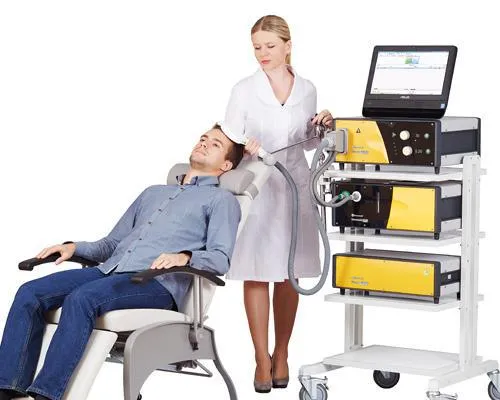Are you struggling with depression, anxiety, or another mental health condition that hasn’t improved with medication or therapy? Transcranial Magnetic Stimulation (TMS) is a non-invasive, FDA-approved treatment that helps activate underactive areas of the brain without the side effects of medication. At HWS Center, we offer personalized Transcranial Magnetic Stimulation in NJ to help individuals achieve long-term relief from symptoms and regain control over their lives.
Transcranial Magnetic Stimulation NJ (TMS) is a scientifically proven treatment that uses magnetic fields to stimulate nerve cells in the brain. It’s commonly used as part of a comprehensive approach to Resistant Depression Treatment New Jersey, and is also showing success in helping individuals with anxiety, OCD, PTSD, and more.
TMS therapy is completely non-invasive. It involves placing a magnetic coil against the scalp to send precise pulses to targeted regions of the brain involved in mood regulation, especially the prefrontal cortex. There’s no need for sedation, anesthesia, or recovery time, and patients can resume normal activities immediately after each session.


During each session, patients are seated comfortably while a trained technician administers the magnetic pulses through a specialized coil. These pulses help “reactivate” areas of the brain that are typically underactive in individuals with depression and related disorders.
Each session lasts around 20 to 30 minutes. A typical course of Transcranial Magnetic Stimulation in NJ includes five sessions per week for six to eight weeks, although individual treatment plans may vary. Because it’s non-invasive and medication-free, most patients experience little to no side effects usually just mild scalp discomfort at the start of treatment.
Get help with depression today! It’s important to know that you are not alone.
Studies of TMS have examined its therapeutic potential for treating various diseases, with depression being the most thoroughly studied. In the late 1990s, researchers worldwide published more than 20 randomized, controlled trials studying TMS as a depression treatment. Now, more and more research continues to emerge around the many beneficial uses for TMS, for depression and beyond.
In addition to TMS, innovative treatments like Ketamine Infusion Fort Lee are gaining attention for their effectiveness in addressing severe or treatment-resistant mental health conditions. Research indicates TMS Therapy to be beneficial in treating depression, anxiety, obsessive-compulsive disorder, post-traumatic stress disorder, attention deficit hyperactivity disorder, bipolar disorder, dementia, and more!










More individuals across New Jersey are choosing TMS because it offers real, lasting relief without relying on medications that may cause unwanted side effects or emotional numbness.
FDA-approved for depression and OCD
Non-invasive, outpatient-based treatment
No systemic side effects (e.g., weight gain, fatigue)
Drug-free alternative to antidepressants
Covered by most major insurance plans
Can be used alongside therapy or existing medication
TMS therapy empowers patients to take control of their mental health in a natural, safe, and effective way.

Most patients are fully at ease during TMS Therapy sessions, experience little to no side effects. Some report a slight tapping sensation when starting TMS, but many claim it fades as they become accustomed to the treatments. Other side effects may include mild headaches, tingling, or mild scalp or neck pain.
While TMS Therapy is considered safe and fully backed by scientific evidence, a few people should not participate in TMS:
Always consult with your care team when beginning a new treatment.
Before starting TMS therapy, you’ll meet with a licensed mental health professional at our NJ clinic for a thorough evaluation. We’ll review your medical and psychiatric history to determine if TMS is appropriate for you.
If you’re a good candidate, our team will create a personalized treatment plan designed around your symptoms, goals, and availability. You’ll receive TMS therapy in a private, quiet setting fully awake, without sedation or interruptions to your daily life. Many patients begin noticing improvement within the first few weeks of treatment.
If you have questions about TMS Therapy Cost, our staff can help you understand pricing, insurance coverage, and financing options during your initial consultation.
At HWS Center, we are proud to be a trusted provider of Transcranial Magnetic Stimulation in New Jersey. Our team of experienced clinicians combines science-backed care with a warm, patient-centered approach. We understand how challenging mental health struggles can be and we’re here to help you take the first step toward real recovery.
We offer specialized services such as TMS For PTSD, providing hope and relief for individuals who haven’t responded to traditional treatments. Additionally, our evidence-based approach to Autism Treatment In New Jersey supports individuals and families with compassionate, individualized care.
With a strong focus on clinical excellence, compassionate support, and long-term success, we are committed to helping you feel like yourself again.
If you’re looking for a safe, effective, and medication-free treatment for depression, anxiety, or OCD, Transcranial Magnetic Stimulation NJ could be the answer. Don’t wait to feel better.
Schedule your free consultation today and take the first step toward lasting mental wellness.
Transcranial Magnetic Stimulation (TMS) is a non-invasive therapy that uses electromagnetic pulses to stimulate parts of the brain linked to mood control. It’s FDA-approved for depression and OCD and is often used when medications haven’t worked.
Yes. TMS therapy is considered extremely safe and well-tolerated. It does not require anesthesia or medication, and most patients experience no side effects beyond mild scalp discomfort at the start of treatment.
Each session lasts about 20 to 30 minutes. Patients typically receive TMS five days a week for six to eight weeks, depending on their treatment plan and progress.
Some patients report improved mood, energy, and sleep within two to three weeks of beginning treatment. Full effects typically build over the full course of sessions and can last for months or longer.
Many of our treatment programs are covered by insurance. Contact your insurance provider to verify benefits for mental health care.
We currently accept the following insurance plans:
Other insurance plans are in progress.
Self-pay plans would be discussed on an individual basis.
While FDA approval currently covers depression and OCD, TMS is often used off-label to help with anxiety, PTSD, and bipolar depression. Many patients in New Jersey have experienced meaningful symptom relief through targeted brain stimulation therapy.
Look for licensed therapists, psychiatrists, or a mental health treatment center specializing in personalized treatment plans for major depressive disorder and other mental health conditions.
We use cookies to improve your experience on our site. By using our site, you consent to cookies.
Manage your cookie preferences below:
Essential cookies enable basic functions and are necessary for the proper function of the website.
Google reCAPTCHA helps protect websites from spam and abuse by verifying user interactions through challenges.
Google Tag Manager simplifies the management of marketing tags on your website without code changes.
You can find more information in our Cookie Policy and Privacy Policy.